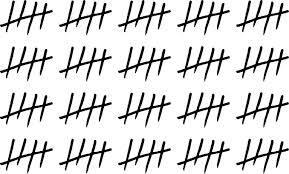Only 6570 More Days
How old are you? At the time of this writing, I’m fifty-two years old. I’ll be fifty-three in less than three months.
By today’s standards, I’m middle-aged bordering on, well; let’s not go there. I’ll be seventy in only 6570 more days.
How old are you?
Our thinking about age is one of the many areas where what we think is normal isn’t really normal at all. We think living seventy or eighty years is a good, rich long life. And by our cultural standards it may be. But by biblical standards it is short…tragically and insultingly short.
As for the days of our life, they contain seventy years, or if due to strength, eighty years, yet their pride is but labor and sorrow; for soon it is gone and we fly away, Psalm 90:10.
Psalm 90 is widely believed to have been authored by Moses. In it, Moses gives us a different take on aging. He suggests that living seventy or eighty years is nothing to boast about, and that even our pride in our supposedly long lives is really nothing more than labor and sorrow.
Moses knew (and probably authored) the accounts in Genesis of men and women living eight and nine centuries, not decades. Kind of puts a new spin on old age, doesn’t it?
Remember that Adam and Eve were created without the ability to die. They were intended to live eternally without having to pass through death. But after their rebellion, sin crept in and began to work its nasty work on humans. And as it did, lives gradually got shorter.
Moses writes, “For we have been consumed by Your anger and by Your wrath we have been dismayed. You have placed our iniquities before You, our secret sins in the light of Your presence,” Psalm 90:7-8.
As sin and death began to work their misery on humanity and to shorten our lifespans, the heaviness and difficulty that comes from being out of fellowship with God and actually living under his wrath also worked to shorten our days.
Fast-forward however many millennia that have passed between us and the first humans and you find us living in a world where we think making it to seventy or eighty is a really big deal. We think hearing loss and bad joints and our hair falling out and being confined to wheel chairs and memory loss and dementia are all just part of growing old.
But the sickening reality is that neither growing old nor the horrible and undignified effects of aging are part of what God intended. There’s nothing normal about them.
We stand at the funeral of a septuagenarian and talk about what a good and long life he or she had. But rather than something to celebrate, it should make us all really angry. That septuagenarian was robbed. And so were we.
Death and sin have stolen our lives from us. They’ve all but muted our days, and we don’t even realize it. That’s why a major part of the Gospel is the promise of eternal life, including the physical resurrection and restoration of human bodies. Death ultimately will not win.
We will live and dance and worship and laugh forever. We won’t get hungry or sick or tired or sleepy. The effects of sin and death will be forever undone. That’s our Gospel. That’s our hope.
But in the meantime, we labor on. Moses wisely conceded: For all our days have declined in Your fury; we have finished our years like a sigh, Psalm 90:9.
A few verses later, Moses offered an amazingly and obviously inspired prayer: So teach us to number our days, that we may present to You a heart of wisdom, Psalm 90:12.
And what he says in that verse is really the heart of what I want to say to you in this blog.
We need to number our days. We need think about how short and fleeting our lives really are, especially in light of what God intended. And by thinking seriously about the brevity of our days, we will gain a heart of wisdom.
How does numbering our days make us wiser? By refocusing our attentions.
Imagine that you have a dream tonight, and in that dream you are shown a wall filled with tally marks. You know, tally marks have four vertical marks side-by-side and then a fifth diagonal line running through them, thus distinguishing a group of five.
The wall was divided into two groups: the first group representing the days you have already lived, and the second showing the days you have left to live.
In your dream, you’re shocked at the relatively few marks you have on the left-to-live side of your wall. It’s devastating. I mean, we spend our lives thinking and living like we have all the time in the world left to live. We live like our days are infinite.
But when you see the marks, and specifically, how few of them you have left, it changes your point of view entirely.
Imagine having that dream and then waking up the next day. How would you live differently? How would your priorities change? How would your pursuits look different? How about your relationships?
That’s Moses’ point: He who numbers his days and lives accordingly has a heart of wisdom. Your days matter, and they are painfully brief. Don’t waste them.
Now before you get all depressed and bummed out, remember that Heaven is on the other side of this life. So in one sense, we’re looking at a countdown to the greatest party ever.
But from the earthly side, it does indeed create a sense of urgency. At least it should.
If I live to be seventy—and that’s a big if, as I could die of any number of causes before then—then I have only 6570 days left to live, love, heal, bless, forgive, share the Gospel, serve others and serve God’s Kingdom.
What about you? What will you do with your days?
So teach us to number our days, that we may present to You a heart of wisdom. Psalm 90:12
The post Only 6570 More Days appeared first on Will Davis Jr.





